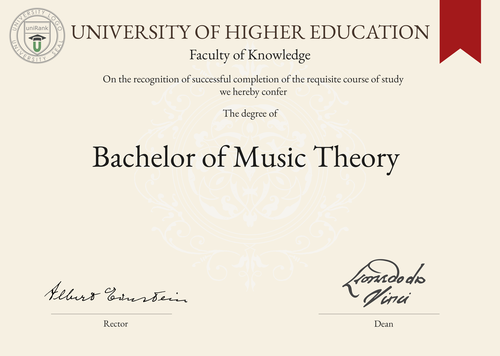
Bachelor of Music Theory (BMusT)
Guide to Bachelor of Music Theory Program/Course/Degree
Bachelor of Music Theory (BMusT)

Program Name:
Bachelor of Music TheoryProgram or Degree abbreviation:
BMusTDuration range:
The duration of a Bachelor of Music Theory program typically ranges from 3 to 4 years.Tuition range:
The tuition fees for a Bachelor of Music Theory program can vary significantly depending on the country and university. It is recommended to check with specific institutions for accurate information.Overview:
The Bachelor of Music Theory program is designed to provide students with a comprehensive understanding of music theory and its application in various musical contexts. Students will develop skills in analyzing, interpreting and composing music, as well as gain a deep understanding of music history and its cultural significance.Curriculum Overview by year:
- Year 1: Introduction to Music Theory, Ear Training, Music History, Applied Instrument/Voice Studies - Year 2: Advanced Music Theory, Composition Techniques, Music Analysis, Electives - Year 3: Orchestration, Counterpoint, Music Technology, Electives - Year 4: Capstone Project, Specialization Courses, Performance OpportunitiesKey Components:
- Music Theory: In-depth study of harmony, melody, rhythm and form. - Composition: Developing skills in creating original musical works. - Music Analysis: Analyzing and interpreting various musical compositions. - Music History: Exploring the historical development of music and its cultural context. - Performance: Opportunities to showcase musical abilities through instrument or voice.Career Prospects:
Graduates of a Bachelor of Music Theory program can pursue various career paths, including: - Music Theory Instructor - Composer/Arranger - Music Critic/Reviewer - Music Librarian - Musicologist - Music ResearcherSalary Expectations:
The salary expectations for individuals with a Bachelor of Music Theory degree can vary depending on factors such as location, experience and specific career path. It is advisable to research salary ranges in the desired field and region. For a more accurate understanding of salary expectations, you can utilize the Job Sites Search Engine, from our sister site jobRank, which searches over 4,600 job sites worldwide. Make sure to specify not only the job title but also the country you are interested in.Conclusions:
It is important to note that the duration, tuition fees, curriculum, key components, career prospects and salary expectations of a Bachelor of Music Theory program can vary based on the chosen country or location of study, as well as the specific university. Prospective students are encouraged to research and compare different programs and institutions to find the best fit for their goals and aspirations. Visitors interested in pursuing a Bachelor of Music Theory degree can utilize the uniRank World Universities Search Engine to search for institutions offering this specific degree worldwide. This search engine provides a comprehensive database of universities and their programs, allowing individuals to explore options and make informed decisions about their education.World Universities Search Engine
search for Bachelor of Music Theory (BMusT) and add the Location (country, state etc.) or specific University you are interested in studying at.
Query examples:
- Bachelor of Music Theory (BMusT) United States
- Bachelor of Music Theory (BMusT) United Kingdom online
- Bachelor of Music Theory (BMusT) Australia international students
- Bachelor of Music Theory (BMusT) University of California
- Bachelor of Music Theory (BMusT) University of London tuition fees
- Bachelor of Music Theory (BMusT) University of Sydney scholarships
Share Program/Course
Interesting? Share this program/course/degree info with your friends now.